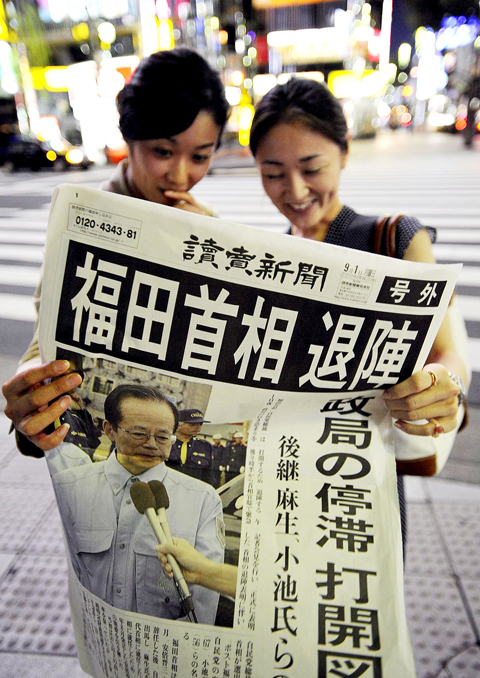Asia’s largest economy was left rudderless again yesterday after Japan’s prime minister quit suddenly, sparking concerns that free-market reforms will be put on a backburner as a recession looms.
There was a weary sense of deja vu on financial markets, as the return of the revolving door politics of the recession-ridden 1990s left the country searching for its third prime minister in less than two years.
Whoever replaces Yasuo Fukuda will inherit the same problems — a deadlocked parliament, a worsening economy, an ageing population and huge public debts.

PHOTO: EPA
The Nikkei stock index ended down 1.75 percent while the yen was higher.
“The political uncertainty may add volatility to the market in the short term,” warned Kenichi Kawasaki, chief economist for Lehman Brothers in Tokyo.
“However, we do not expect economic policies to change significantly as a result of a change in the prime minister,” he said, predicting the ruling party could be forced to hold an autumn general election.
Fukuda’s surprise announcement late on Monday came after he failed to reverse a slump in his popularity despite unveiling a major economic stimulus package.
Many investors had already been disillusioned about the prospects for further economic reform given the legislative deadlock and signs that the ruling party is more concerned about the next election.
“There is already political deadlock and elections are expected in the coming year,” said Kazuhiro Takahashi, head of equities at Daiwa Securities SMBC.
Former foreign minister Taro Aso, seen by many as the front-runner to replace Fukuda, would be likely to push for increased government spending to support the economy if he takes office, analysts said.
Aso would “appeal for an increase in budget-spending to support economic activity,” predicted John Richards, head of Asia-Pacific Strategy at RBS Securities.
Until recently, Japan’s economy had been recovering from a slump stretching back more than a decade. But a contraction in the second quarter left the country teetering on the brink of recession.
Some experts said the change of leadership could be positive in the long run if it helps to bring about a realignment of Japanese political forces, with reform-minded politicians taking power.
Fukuda’s resignation “will be a disruption for Japanese politics and markets in the short run, but provide support in the medium to long run,” Morgan Stanley economists wrote in a note to clients.
Reform efforts lost momentum after Junichiro Koizumi stepped down as premier two years ago.
He set out to slash public works spending and break up the post office with its US$3 trillion in assets, which were used to bankroll often wasteful but politically popular public works projects.
The political stalemate has heightened nostalgia on the market for Koizumi, although observers say chances are low he would mount a comeback.

The CIA has a message for Chinese government officials worried about their place in Chinese President Xi Jinping’s (習近平) government: Come work with us. The agency released two Mandarin-language videos on social media on Thursday inviting disgruntled officials to contact the CIA. The recruitment videos posted on YouTube and X racked up more than 5 million views combined in their first day. The outreach comes as CIA Director John Ratcliffe has vowed to boost the agency’s use of intelligence from human sources and its focus on China, which has recently targeted US officials with its own espionage operations. The videos are “aimed at

STEADFAST FRIEND: The bills encourage increased Taiwan-US engagement and address China’s distortion of UN Resolution 2758 to isolate Taiwan internationally The Presidential Office yesterday thanked the US House of Representatives for unanimously passing two Taiwan-related bills highlighting its solid support for Taiwan’s democracy and global participation, and for deepening bilateral relations. One of the bills, the Taiwan Assurance Implementation Act, requires the US Department of State to periodically review its guidelines for engagement with Taiwan, and report to the US Congress on the guidelines and plans to lift self-imposed limitations on US-Taiwan engagement. The other bill is the Taiwan International Solidarity Act, which clarifies that UN Resolution 2758 does not address the issue of the representation of Taiwan or its people in

US Indo-Pacific Commander Admiral Samuel Paparo on Friday expressed concern over the rate at which China is diversifying its military exercises, the Financial Times (FT) reported on Saturday. “The rates of change on the depth and breadth of their exercises is the one non-linear effect that I’ve seen in the last year that wakes me up at night or keeps me up at night,” Paparo was quoted by FT as saying while attending the annual Sedona Forum at the McCain Institute in Arizona. Paparo also expressed concern over the speed with which China was expanding its military. While the US

SHIFT: Taiwan’s better-than-expected first-quarter GDP and signs of weakness in the US have driven global capital back to emerging markets, the central bank head said The central bank yesterday blamed market speculation for the steep rise in the local currency, and urged exporters and financial institutions to stay calm and stop panic sell-offs to avoid hurting their own profitability. The nation’s top monetary policymaker said that it would step in, if necessary, to maintain order and stability in the foreign exchange market. The remarks came as the NT dollar yesterday closed up NT$0.919 to NT$30.145 against the US dollar in Taipei trading, after rising as high as NT$29.59 in intraday trading. The local currency has surged 5.85 percent against the greenback over the past two sessions, central